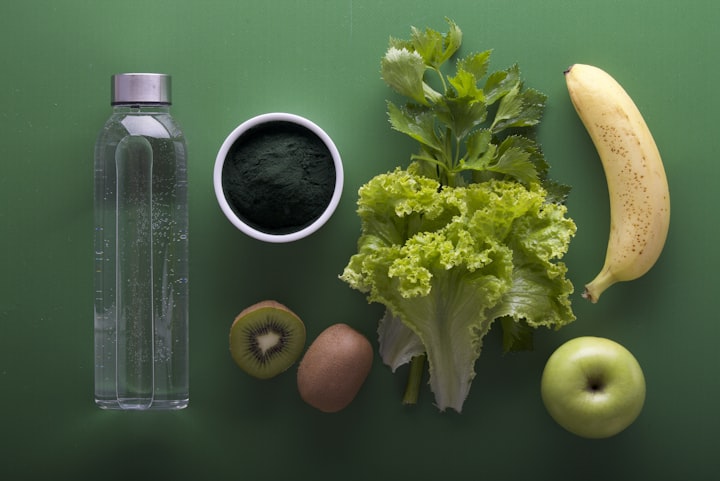Revitalizing Your Vision: The Benefits of Eye Supplements
Exploring the Science and Potential of Nutritional Supplements for Improved Eye Health

Introduction
Eyebright
Eyebright is a plant that has been used for centuries to treat eye conditions, including conjunctivitis and blepharitis. It contains tannins and flavonoids that have anti-inflammatory properties, as well as quercet ( powerful antioxidant). Quercetin is also found in red wine, apples and onions.
Eyebright may help reduce inflammation caused by allergies or infections.
Quercetin is important for protecting your eyes from free radical damage.
Eyebright, also known as Euphrasia officinalis, is a perennial herb that grows in Europe and North America. Its leaves are used as an herbal medicine to treat eye-related conditions such as conjunctivitis (pink eye), dry eyes and blepharitis (eyelid inflammation).
Eyebright contains tannins that help reduce inflammation in the eyes by stimulating blood flow to the area. It also has anti-bacterial properties that may help prevent infections like conjunctivitis or viral keratitis (a corneal ulcer).
The best way to incorporate Eyebright into your diet is by drinking tea made from dried leaves or taking supplements containing extracts of this herb
Quercetin
Quercetin is a flavonoid found in many fruits and vegetables, including apples, onions and tea. It's also one of the most researched antioxidants for its role in protecting the body from free radicals. Quercetin has been shown to have antioxidant properties that help reduce inflammation as well as improve blood flow to the eyes by strengthening capillaries (small blood vessels).
Quercetin may be beneficial for people who suffer from dry eye syndrome because it helps maintain moisture levels in tears by increasing their production; however, more research is needed before we can say with certainty that it's effective at treating this condition specifically.
Bilberry
Bilberry is the common name for the shrub Vaccinium myrtillus, which grows in Europe and Asia. Bilberry is also known as European blueberry, whortleberry, huckleberry and blaeberry (meaning "blue berry").
Bilberries contain anthocyanins that have been shown to reduce inflammation in eye's retina and improve blood flow in capillaries of the retina. This helps prevent macular degeneration by reducing damage caused by free radicals (unstable molecules) that can cause oxidative stress on cells within your body, including those found in your eyesight.
Lycopene
Lycopene is a carotenoid, which means that it's a pigment found in plants. It's responsible for the red color of tomatoes and watermelon, among other foods. Lycopene has been shown to have anti-inflammatory effects on the body and may help prevent heart disease by lowering cholesterol levels and blood pressure.
Lycopene can be found in many fruits and vegetables such as papaya, guava, mangoesespecially green ones), watermelon and carrots; however you'll need to eat quite a lot of these foods to get enough lycopene for eye health benefits! If you don't like eating these foods regularly then there are supplements available containing concentrated amounts of this nutrient too - but check with your doctor before taking any supplements or medications because some interactions could occur between them both if taken together at once!
Magnesium
Magnesium is a mineral that helps to maintain healthy bones and teeth, as well as regulate blood pressure. It also plays an important role in converting food into energy, maintaining muscle function and supporting a healthy nervous system. Magnesium is found in many foods including leafy green vegetables like spinach or kale; nuts such as almonds or cashews; seeds like pumpkin seeds; whole grains such as oatmeal or brown rice; beans/legumes (e.g., black beans) or dairy products like yogurt & cheese.
In to getting enough magnesium from your diet alone it can also be taken as a supplement if you don't meet the recommended daily amount through food sources alone
Rutin
Rutin is a flavonoid that has been shown to be beneficial for eye health. Rutin has been used in traditional medicine to treat cataracts and glaucoma, but it also helps improve blood circulation and reduce inflammation.
Rutin is found in many fruits and vegetables including buckwheat, apples, strawberries, blackberries and raspberries. You can also find rut store or online if you do not eat enough of these foods regularly.
Grape Seed
Grape seed extract is a natural antioxidant that can help protect the eyes from free radical damage. It's also been shown to improve blood flow to the retina and reduce swelling in the optic nerve, which may help prevent glaucoma.
Grapeseed oil has many of these same properties, but it's not as concentrated as grape seed extract--you'd need to eat about 1 pound (450 g) of grapes per day to get the same amount of as you would from just one teaspoon (5 ml) of grape seed extract!
Zeaxanthin & Lutein
Zeaxanthin and lutein are two carotenoids that are found in the macula, the part of eye for your central vision. The macula is a yellow spot on the retina that contains millions of light-sensitive cells called rods and cones. These cells convert light into electrical signals that are sent to your brain through optic nerve fibers.
Zeaxanthin and lutein help protect these sensitive structures from damage caused by free radicals (unstable molecules) that can cause cataracts or age-related macular degeneration (). Zeaxanthin also helps prevent glare from bright sunlight by filtering out short wavelength blue light rays before they reach your retina.
Conclusion
Eyebright is a flowering plant that has been used for centuries to treat eye problems. It contains the flavonoid quercetin, which has antioxidant properties, as well as tannins and other compounds that may help fight inflammation in the eyes.
Eyebright can be taken in capsule form or made into tea by steeping 1 teaspoon of dried herb in 1 cup boiling water for 10 minutes before straining out the herbs and drinking 3 times daily.
Quercetin is an antioxidant found naturally in foods such as apples, red onions and berries like blackcurrants and bilberries (also known as blueberries). Studies show that quercetin may help reduce inflammation around blood vessels near the front surface of your eye (cornea), which could help prevent macular degeneration from progressing further into its more advanced stages.
=>> Click here for latest vision support formula
About the Creator
Pranjal Bordoloi
I am nature lover and fitness enthusiast who believes in living healthy and active lifestyle. I am interested in fitness and have incorporated regular exercise into my daily routine. I encourage others to do the same.






Comments
There are no comments for this story
Be the first to respond and start the conversation.